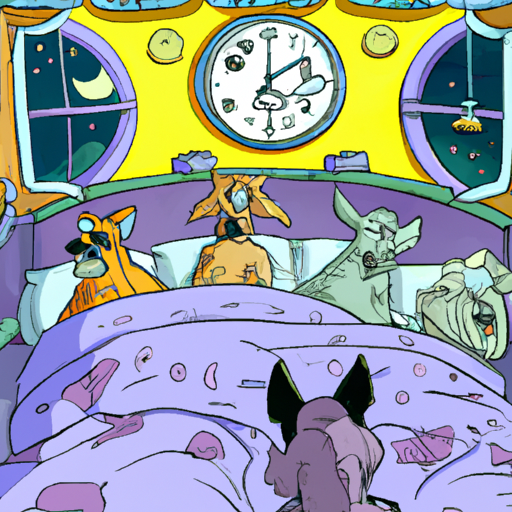Introduction
You’ve probably noticed your furry friend snoozing during the day and wondered, “Do dogs sleep all night?” Understanding your dog’s sleeping patterns and habits can be an essential part of being a responsible and caring pet owner. This guide will take you on a journey into the nighttime behaviors of your canine companion.
Understanding Dog Sleep Cycle
Just like us, dogs have sleep cycles that include stages of deep sleep and Rapid Eye Movement (REM). During REM, dogs can dream just like humans do. However, unlike humans, dogs spend only about 25% of their sleep in this deep stage.
- Light Sleep Stage: Dogs are easily woken up from this stage.
- Deep Sleep Stage: This is the restorative stage of sleep.
- REM Stage: This is where dreaming occurs.
Factors Influencing Dog’s Sleep
Several factors can influence how much a dog sleeps. These include:
- Age: Puppies and older dogs tend to sleep more.
- Activity Level: Active dogs sleep less than inactive ones.
- Health: Health issues can affect the quality and duration of a dog’s sleep.
Do Dogs Sleep All Night?
In general, dogs do sleep at night, typically around 8-10 hours. However, their sleep is often interrupted for various reasons, such as to patrol the house or respond to noises. Dogs are adaptable and can adjust their sleep patterns to align with their owners.
How Can You Improve Your Dog’s Sleep?
Knowing how to improve your dog’s sleep quality can ensure an energetic and healthy pet. Here are some tips:
- Maintain a regular sleep schedule: Dogs thrive on routine.
- Provide a comfortable sleeping area: Make sure your dog has a comfortable and quiet place to sleep.
- Regular exercise: Physical activity can help your dog sleep better at night.
- Manage diet: Avoid feeding your dog right before bed.
Dog Sleep Disorders
Just as in humans, dogs can also suffer from sleep disorders. Here are a few common ones:
- Insomnia: This can be due to anxiety, stress, or physical illness.
- Sleep Apnea: This is common in obese and brachycephalic (short-nosed) breeds.
- Narcolepsy: This leads to excessive daytime sleepiness and sudden sleep attacks.
| Sleep Disorder | Symptoms | Treatment |
|---|---|---|
| Insomnia | Difficulty falling or staying asleep | De-stress environment, Medication |
| Sleep Apnea | Snoring, Daytime fatigue | Weight management, Surgery |
| Narcolepsy | Excessive daytime sleepiness, Sudden sleep attacks | Medication, Management of triggers |
FAQs
Q: How much do dogs sleep?
A: On average, dogs sleep 12-14 hours a day. Puppies and older dogs may sleep even more.
Q: Why does my dog sleep so much?
A: Several factors can influence a dog’s sleep, including age, activity level, and health.
Q: What if my dog has trouble sleeping?
A: If your dog is having trouble sleeping, it could be due to a disorder like insomnia or sleep apnea. It’s best to consult with a vet to determine the best course of action.
Q: Can I do anything to help my dog sleep better?
A: Yes, maintaining a regular sleep schedule, providing a comfortable sleeping area, ensuring regular exercise, and managing your dog’s diet can all help improve your dog’s sleep.
Conclusion
Understanding your dog’s sleep patterns can help you better care for your furry friend. By ensuring they get the right amount of sleep and addressing any potential sleep issues, you can ensure a happy, healthy pet. Remember, if you have any concerns about your dog’s sleep habits, it’s always best to consult with a vet.



